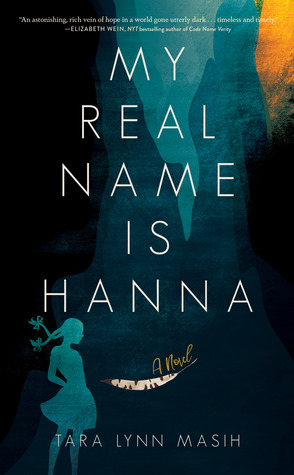
My thanks to NetGalley for a review copy of this book.
This is a story told by Hanna Slivka to her daughter, about a part of her life that she has so far kept hidden from her—when at fourteen, she was living with her family in Russian occupied Ukraine. Life had become hard, their possessions reduced because of the strict rules the communists went by, and religion, also taboo to the communists, was something that couldn’t be practised as openly as when they were ‘free’. But these hardships seem nothing compared to what lay ahead for the Jewish family (and others in their village) when Hitler invades. Initially, the impact on them is in terms of helping persecuted people from other villages and towns to escape, more restrictions on food and resources, and having to face taunts and insults from some members of the community they have been part of. But before long, despite many friendly and kind (and indeed brave) neighbours’ help in keeping them safe in their own house, they soon have to leave and go into hiding for safety. For a period of over two years they must live, first in an isolated forest cabin, and then in an underground cave with others of their community, with precious little to eat, fearing for their lives every minute, not only from the Germans but also from many in their own village/surroundings who are willing to turn against them as easily. Thankfully for them, not all are like that and they do manage to get help from various friends, particularly their neighbour Alla Petrovich, and friend, farmer Yuri Janowski.
While this story is a piece of fiction, the author has based it on a true incident of the Stermer family who survived the war living in such caves for over 500 days, a family who survived intact in a country where only 5 per cent and region where only 2 per cent of Jews survived. This is a very hard book to read and yet such an important one, for it brings us face to face with perhaps the ugliest side of humanity, as well as I guess, the best side. While the Slivkas do not see the worst of the Nazi atrocities, what little they see or hear of is also something that words can’t really describe. (I couldn’t help but wonder, one would dub Hitler as ‘mad’ at the least for the way his warped mind worked, but what about those hundreds of thousands who followed in his footsteps and perpetuated unspeakable atrocities? What is worse, as the author too writes in her note at the end, is human beings don’t seem to have learnt from this and continue to persecute on the basis of religion, of skin colour, of race.) The hardships (too mild a word, really) the family and their friends face in having to live with so little, in circumstances that we would wish on no living creature, and always having to look over their shoulder, perpetually being in fear of their lives is something that one can’t even imagine. What immense courage it must have taken to have the will to fight on, to live on, when literally everything seems against you, the invaders but also people that were of their own place, and the very the circumstances in which you are forced to live—disease, sickness, and malnutrition posing equally serious threats of their own. Each page one reads, each day that one reads of is heart-breaking. But there is hope in that for all of those who were cruel, who turned against their own, there were as well a few, who stood by them, facing as much danger of being caught and punished. They at least show that there is some ‘human’ left in human beings.
But amidst all of this suffering and pain and heartbreak, there was something that kept the families’ lives somewhat normal, and brought a ray of pleasantness into the reader’s experience and this was how rich in culture this book was. The festivals that the Slivkas observed (now so much more familiar to me since I read All-of-a-Kind Family), the birthdays, were something, that even if could not be observed openly or fully as they were before, gave them something to hold on to, something that made life more liveable perhaps, though later, when food and resources becoms more and more scarce, these too are no longer there. But I loved the descriptions of these in the initial parts of the book as I did those of the local culture, Alla Petrovich’s egg-painting (pysanky), the local parades and festivals, and daily life.
I haven’t read many books with a holocaust theme (only Anne Frank’s Diary, really), mostly because I know how heart-rending they will be (and how hard to handle), but I realise, it is also so very important to read them, to face how low human being can fall, how little they deserve the superiority they assume, though there are those in every circumstance, who certainly do deserve every accolade, who are really ‘human’. This is certainly one such book, and I can’t recommend it highly enough.
I can understand exactly how you feel. I saw “The Diary of Anne Frank”, the movie, as a child, and it still haunts me. Read the book much later of course, and am still not inclined to reading another such, fact or fiction
LikeLiked by 1 person
True–I felt the same but then one does need to face up to it, once in a way…
LikeLike
Your review is lovely and highlights the beauty of this book and the humanity of its characters! You are absolutely right about the culture included. Well-done!
LikeLiked by 1 person
Thank you for taking the time to look it up 🙂
LikeLiked by 1 person